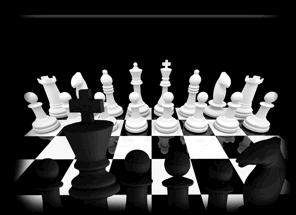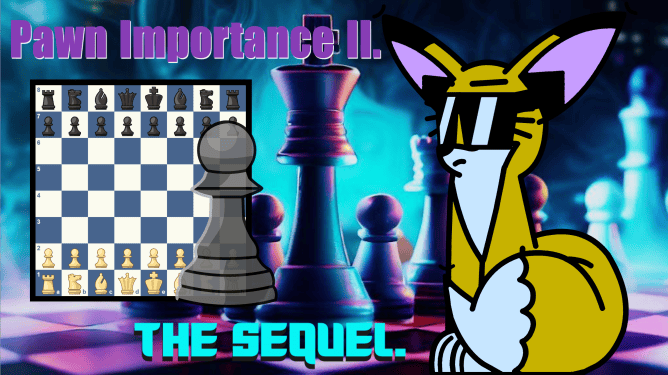
Pawn vs. Rook
Get this! You read my pawn sequel blog too much, so you hopped into a chess game and traded off nearly every piece on the board.
All that you have left now is a pawn.
But your opponent ended up with a rook.
Blog Overview
- Introduction
- One Pawn Versus a Rook
- Two Pawns Versus a Rook
- Three Pawns Versus a Rook
- Four or Five Pawns
- Live Showcase
- Further Mentions/Conclusion
Before you speed dial your agent, we need a disclaimer, quoted from an anonymous man who I assume is very wise.
"Rooks are better than pawns."
Now, logically you could just scroll right down to the comments section and tell me that my thumbnail did not meet your expectations. But actually, there's a lot more about pawns versus rooks, especially during endgames. There are so many possible positions of rooks, pawns, and kings that can change the final game result.
Quoted again from the same anonymous man,
“Rooks are like towers of strength, guarding the corners and sweeping the ranks. Pawns are like soldiers of courage, advancing slowly and sacrificing themselves. Chess is not about the value of the pieces, but the skill of the player.”
Rooks may be worth five points and pawns may be worth one point, but pawns have a special advantage.

Pawns can promote to any piece with more value than a rook! Or they could promote to one of those lousy minor pieces that you traded off before the intro. Either way, pawns can become a really big threat.
Does this mean that pawns are worth more than rooks? Technically, no. But are they worse? Well, that's why we are here. To march your last pawn into the depths of the legendary endgame to defeat the mighty rook.

In other words, we will be covering the basics of pawn vs. rook endgames and looking at common examples. Most of these examples will take place in a perfect world, where the rook and opposing king is always blocking the way of the pawn(s).
And yes, you may have guessed, I will also be showcasing games featuring pawns vs. rooks.
So pull up your comfy chair, turn on your favorite music, and get ready to disco.
One Pawn Versus a Rook
Surprisingly, (actually not surprisingly) when a single pawn is against a rook, the side with the rook almost always wins.
If the pawn is about to promote to a queen, it is usually an easy draw for whoever has the rook:
So, a pawn versus a rook is simple. The rook either takes the win or makes a draw. Now we can roll the credits which you will ignore anyway, then you can finally tell me what comment number you got.
But wait a second, what do we have here?
one... no, TWO PAWNS NOW?
Two Pawns Versus a Rook
Okay, this changes things a little bit.
Fine, so actually two pawns does not change much. Rook still wins.
But what if the pawns are closer to promoting? Will that make a change?
Nope. Two pawns on the sixth rank will never be enough to win.
If we study that diagram closely, we can conclude that I was wrong. It is, indeed, possible to win (or in some other cases, possible to draw) with two pawns on the sixth rank.
Now, if we move those pawns even closer to promoting, well, you could probably guess what happens.
After mr. rook sided opponent realizes there is nothing he can do to stop the pawns on the edge of promoting...

Although, in rare occasions, black can force a draw:
We can conclude that a rook will probably win against two pawns, provided that they are not very close to promoting.
Now things can be switched up by adding another pawn.
Three Pawns Versus a Rook
Here's a good question, could you win with three pawns if your opponent just has a rook? Or is it even possible? Before we look at actual answers, I thought that I would play three pawns against stockfishy to see what would happen. It was rather embarrassing for me:
After a bit more scientific research, I found out that a rook will almost always beat three pawns. So there, it is not because stockfish thinks he's stronger than me.
Assuming you are half as curious as I am, what happens if the pawns are a little closer? Let's say... the fifth rank.
You see, having three pawns on the fifth rank is actually a draw, assuming that black considered every possible rook sacrifice.
Now, say the pawns march up to the sixth rank. Can black still force another draw?
As long as white pushes the right pawn, three pawns on the sixth rank should be a win.
And if we march the pawns up the board even further than the sixth rank, it only makes it even easier for white to win. I'll let you imagine that because our diagram supply is limited.
Now, there are a lot of possible positions to put the pieces, and we don't have all day to look at them each individually. So I thought that I would just randomly place the all of the pieces on the board and play it against stockfishy.
Four or Five Pawns
Moving to four pawns on the second rank (the starting squares), is it possible for either side to win? It may sound crazy, but four pawns is not even enough to win against a rook. If white plays precisely enough and black does not, white might get away with a draw. But chances are, white is gonna end up like this:
And the rest of the game is history.
You'll just have to trust me with this, if the pawns are moved one rank closer, the game should be a draw, and if they are moved even closer to promotion than that... well, white wins.
We can safely state that most of the time, white will probably win with a line of four pawns against a rook.
Yes, a line of four pawns. You have not forgot that it's possible to stack pawns, did you?
Just in case you did, here I am, embarrassing myself infront of stockfishy again:
Enough of that.
Well, I believe that we have covered everything that we can about pawns against rooks, and-
-checks script-
Oh, yeah, what happens if you have five pawns versus a rook? After all, they are both worth five points. Let's take a look:
Although it's a draw, it actually makes sense because each side has five points worth of material.
And yes, if you put the line of pawns higher up the board... white wins.
Now, sure, you could scroll to the bottom, put a nice comment, then demand I give you cheers because you are the only person who actually has respect for my blog. Jk, that's not really respect, I mean who doesn't want free cheers? What am I trying to say here, blah blah blah
I still have one more war with stockfish, the ultimate battle of who is better, pawn or rook. Let's take a look at that.
You better grab more popcorn.

So... stockfishy or black won. Either way, that means I lost.
You can go home now.
-- Live Showcase --
Now that we know what pawn vs. rook means, I've put together a showcase of what I assume are open-seek games. I'm not 100% sure if they are open-seek only because it has been over a month since I played a few of them.
After you're done deciding whether or not you want to believe me, here is the showcase:
I hope you enjoyed it.
Do you have an awesome game featuring pawns vs. rooks? Be sure to share it in the comments!
I Found a Cool Rook and Pawn Puzzle
Before we wrap things up, I have one last thing to show you.
I was solving puzzles on ChessKid.com, and I came across a pawn and rook puzzle:
 And I thought, "Well, maybe I should have a puzzle in my pawn vs. rook blog." So, here you go. It should not be too hard:
And I thought, "Well, maybe I should have a puzzle in my pawn vs. rook blog." So, here you go. It should not be too hard:
Further Mentions/Conclusion
Thank you for your time and for checking out my blog.
Linked in the following image, I have a FunMasterMike video about rooks vs. pawns. If you liked this blog and want to learn more about pawn and rook endgames, I would recommend checking that out.
In the meantime, I hope that you liked, learned, or found something amusing in this post. If you have any suggestions/requests/comments/questions, don't hesitate to comment down below.
Have you spotted an error somewhere in this post? Be sure to send a private message to me, @Admiral_ChessBeard right away.
I hope to see you around. Keep playing chess and having fun!
Your friendly chess nerd,
Ray G. Scout




